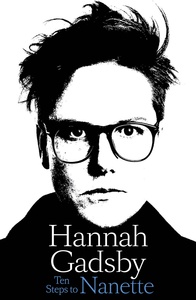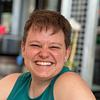Take a photo of a barcode or cover
dark
emotional
funny
medium-paced
adventurous
challenging
funny
inspiring
reflective
sad
slow-paced
"Ten steps to Nanette" was incredible, because @hannah_gadsby is incredible. Hannah's ability to share their isolated journey through life and their own, Very Specific and Individual Trauma in a way that is somehow Universal is masterful. I laughed. I cried. I thought about my own journeys. And I wanted to watch Nanette again, with a new appreciation for the incredible, and incredibly important, piece of art that it is.
Una invitación a ver Nanette con un contexto más claro, haciendo que las primeras veces refleja lo que es para uno en un contexto global; con el libro se permite ahondar en lo que costó a Gadsby llegar a ese maravilloso monstruo, sin perder su tono al describirlo: con la sinceridad y crudeza necesarias, acentuadas por su humor.
If you lived Nanette, this reads a lot like the show. I am stunned by the genius of working positive stimming into the show.
emotional
reflective
medium-paced
emotional
funny
informative
inspiring
slow-paced
I knew about halfway through this book that I want to read it again. Just like her specials, Hannah's writing is layered, intelligent, funny, emotional, raw, complex, self-aware, and fully herself. I learned so much about queer liberation and growing up autistic in Australia, and although Hannah's childhood small town was worlds away from mine, her story held up a mirror to my own. I feel such kinship with Hannah, and I'm so very grateful for her.
• • •
"One of the biggest faults I built into my coming out narrative was that I blamed my mum for my pain. I thought she was responsible for what I had to endure. But I'd been so self-absorbed that I'd never been able to believe anyone else got hurt. I took the lion's share of the brunt, sure, but my family were not the architects of my position in life. I'm only now beginning to appreciate the complicated nature of this kind of fracture: it doesn't matter which side you're on, you still get hurt. But I was too naive at the time to understand that my mum had not rejected me. She has been afraid. She was afraid because she couldn't control the world for me, and it frightened her. And it frightened me."
"Common wisdom has it that the pathway out of trauma is a coherent narrative; but I had a coherent narrative and I was still stuck in the painful maze of my Trauma. I'd tried everything in my power to heal and I was left to wonder whether it was entirely my responsibility. What good is a coherent narrative if people don't want to hear it? Because trauma won't leave you alone until you feel safe, and safety is not something that an individual can summon on their own. Safety is not a gun. Safety is being able to trust that those around you WANT to protect you from harm. But if those around you don't believe you are 'like them,' then they will focus on the discomfort you make them feel, and that discomfort is not a safe space."
"I knew that everything I said could only ever find meaning in the minds of others once it had been filtered through the lens of my body and all the distortions it seems to engender. But I made a decision not to diminish my ambiguity by explaining it; people would just have to sort me out on their own. It was, after all, their problem."
"I decided that I did not want to waste any more of my precious energy trying to police what others have to say about my body or even try and change what it is they believe my body says about my worth as a human. I have not changed my mind since then. I know that so long as my body is understood as female, then my body will always be a target for the hostility and cruel judgment of others. I have every confidence that I will continue to hear all the same horrific things about how I look, and I am sure I will continue to find it painful, but for me this is the last time I will speak about it. I have never identified with how people see me. I have a great big universe of stuff inside of me. None of it is gendered. None of it. I love who I am. It's only on the other side of my skin where the pain begins. But I will not negotiate anymore. I am proud to be Queer."
• • •
"One of the biggest faults I built into my coming out narrative was that I blamed my mum for my pain. I thought she was responsible for what I had to endure. But I'd been so self-absorbed that I'd never been able to believe anyone else got hurt. I took the lion's share of the brunt, sure, but my family were not the architects of my position in life. I'm only now beginning to appreciate the complicated nature of this kind of fracture: it doesn't matter which side you're on, you still get hurt. But I was too naive at the time to understand that my mum had not rejected me. She has been afraid. She was afraid because she couldn't control the world for me, and it frightened her. And it frightened me."
"Common wisdom has it that the pathway out of trauma is a coherent narrative; but I had a coherent narrative and I was still stuck in the painful maze of my Trauma. I'd tried everything in my power to heal and I was left to wonder whether it was entirely my responsibility. What good is a coherent narrative if people don't want to hear it? Because trauma won't leave you alone until you feel safe, and safety is not something that an individual can summon on their own. Safety is not a gun. Safety is being able to trust that those around you WANT to protect you from harm. But if those around you don't believe you are 'like them,' then they will focus on the discomfort you make them feel, and that discomfort is not a safe space."
"I knew that everything I said could only ever find meaning in the minds of others once it had been filtered through the lens of my body and all the distortions it seems to engender. But I made a decision not to diminish my ambiguity by explaining it; people would just have to sort me out on their own. It was, after all, their problem."
"I decided that I did not want to waste any more of my precious energy trying to police what others have to say about my body or even try and change what it is they believe my body says about my worth as a human. I have not changed my mind since then. I know that so long as my body is understood as female, then my body will always be a target for the hostility and cruel judgment of others. I have every confidence that I will continue to hear all the same horrific things about how I look, and I am sure I will continue to find it painful, but for me this is the last time I will speak about it. I have never identified with how people see me. I have a great big universe of stuff inside of me. None of it is gendered. None of it. I love who I am. It's only on the other side of my skin where the pain begins. But I will not negotiate anymore. I am proud to be Queer."
Hannah Gadsby's ability to review her life in details both large and small is amazing. She is a master of storytelling and her humor, whether you like it or not l, and I do, is borne of both severe pain and small moments of joy. This book offers a look inside the brain of someone so complex - ADHD, ASD, LGBTQ+ - that you cannot help but come out the end of it more empathetic towards people that aren't you. Few books catch me at the right time and place as to change me. I'm so happy this one did that.




